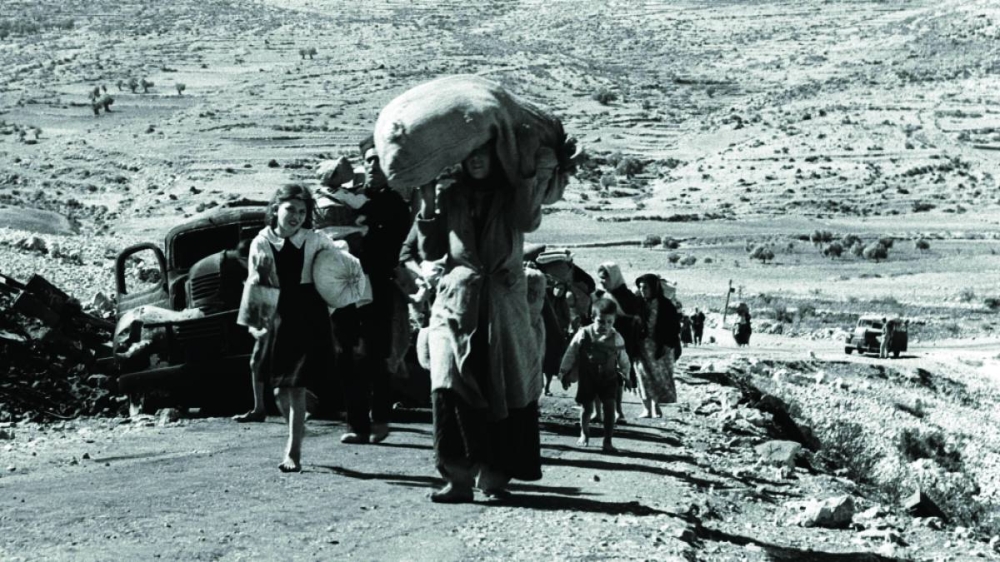The Palestinians will commemorate today (Monday, May 15) the 75th anniversary of the Nakba, and they are more determined and clingier to their right to return to their stolen homeland, affirming that rights do not expire by statute of limitations, and that the memory of their people and generations is alive and will not be forgotten and will not give up no matter how long and how many sacrifices it takes.
The Nakba is a political term that refers to the mass forced displacement of the Palestinian people during 1948 when Jewish gangs expelled nearly 800,000 Palestinian citizens from their cities and villages and destroyed more than 500 Palestinian cities and villages before the establishment of the Israeli occupation entity on the land of Palestine that was subject to the British Mandate for Palestine.
The 75th anniversary of the Nakba comes amid a tense atmosphere in the occupied Palestinian territories and a fierce and unprecedented aggressive attack by the occupation soldiers and settler gangs against people, land, sanctities, trees, and stones in the West Bank, occupied Jerusalem, and the Gaza Strip, to uproot the Palestinians from their lands and break their will to stand firm and their adherence to the right of return and the establishment of their independent state with Jerusalem as its capital.
Today, Palestinian President Mahmoud Abbas will deliver a statement at the UN which will commemorate the Nakba for the first time.
According to Palestinian diplomatic sources, the statement will include a thorough review of the tragedies that the Palestinian people were subjected to after the seizure of their homeland, the expulsion of the majority of its people from their cities, villages, lands, and their conversion into refugees.
The sources added that the UN’ commemoration of this anniversary reflects on fixing the term Nakba as a term that refers to the tragedy of the Palestinians and the crime against humanity committed by Israel against them and refutes the Israeli narrative around it.
This step faces major Israeli obstruction attempts, the latest of which was urging countries not to attend the upcoming statement of President Abbas because Israel does not want the world to know the truth and does not want to talk about the Nakba from the UN platform, because that reveals that Israel’s narrative is false and based on the killing and displacement of the Palestinian people in 1948.
The UN commemoration of the Palestinian Nakba comes based on a resolution adopted by the General Assembly on November 30, 2022, which stipulated that May 15, 2023, is considered a day to commemorate this memory.
The resolution received 90 votes in favour, while 30 countries voted against it, including the UK, Germany, Canada, Sweden, the US, and Israel, while 47 countries abstained from voting.
The General Assembly will hold today a high-level morning session to listen to words of solidarity from the heads of regional groups and many countries that will express their support for the rights of the Palestinian people, especially their right to establish their independent state with East Jerusalem as its capital.
The UN will also hold a cultural festival with live testimonies from refugees, as well as art and cultural performances, photo exhibitions and documents. Ambassador of Palestinian Heritage and Palestinian artist Sanaa Moussa will pay tribute to an evening of heritage national songs expressing the Palestinian people’s adherence to their homeland and land. Several popular gatherings, festivals, parks and marches will be held in various Palestinian areas inside and outside the Occupied Palestinian Territory. Statements will be made confirming the Palestinians’ adherence to the right of return and their refusal to settle or compensate and all settlements and projects aimed at settling their case.
The number of Palestinian and Arab deaths from the Nakba until today, inside and outside Palestine, has reached some 100,000, while the number of deaths from the beginning of the Al-Aqsa intifada in 2000 to the end of last year has reached about 11,540 deaths. However, 2014 was the deadliest year, with 2,240 deaths, including 2,181 deaths in the Gaza Strip. In 2022, there were 231 deaths, including 56 children and 17 women, and more than 10,000 people were wounded. As of the end of March 2022, 4,700 prisoners, including 150 children, were held captive, in addition to 29 female captives.
According to the Palestinian Central Bureau of Statistics (PCBS), the number of Palestinians has doubled several times since Nakba. According to the PCBS, in 1948, the number of Palestinians reached 2mn. Today, it has risen to about 14mn worldwide, with 6.4mn Palestinian refugees at the end of 2020. About half of Palestinians lived today in “historic Palestine”, explaining that 1.7mn Palestinians lived inside Israel. The occupied West Bank, including East Jerusalem, had a population of 3.2mn, and refugees accounted for more than two thirds of Gaza’s 2.3mn inhabitants.
In a report on the occasion of the Palestinian Nakba, the Agency stated that about 28% of the refugees lived in 58 official camps of the UN Relief and Works Agency for Palestine Refugees (UNRWA), spread by 10 camps in Jordan, nine in Syria, 12 in Lebanon, 19 in the Bank and eight in the Gaza Strip.
Seventy-five years after the Palestinian “Nakba”, refugees refuse to waive the “right of return”, which is considered a Palestinian constant. In March 2018 and over a period of months, Gaza Strip-Israel border area witnessed intense weekly demonstrations known as “return marches” involving tens of thousands of Palestinians demanding the right to return to their land and homes, from which they were abandoned in 1948. (QNA)

Nakba... the mass forced displacement of the Palestinian people during 1948 when Jewish gangs expelled nearly 800,000 Palestinian citizens from their cities and villages.
